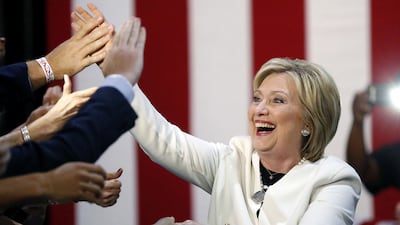PHILADELPHIA // Strong performances from Donald Trump and Hillary Clinton in the Super Tuesday primaries indicate that the 2016 US presidential election will involve starkly contrasting candidates.
One is a billionaire who portrays himself as an anti-establishment figure, and the other is a former secretary of state and first lady who has been a part of Washington’s power circles for two and a half decades.
Super Tuesday is the biggest day for any US presidential candidate before election day as 12 states vote in the primaries and caucuses.
Mr Trump won his Republican rivals in seven states: Alabama, Arkansas, Georgia, Tennessee, Vermont, Virginia, and even liberal Massachusetts where he notched up 49 per cent of the vote – his most commanding victory of the day.
Ted Cruz, the US senator from Texas, won in his home state as well as Alaska and Oklahoma, while Marco Rubio, the senator from Florida, won in Minnesota – his first campaign victory.
After polls closed, Mr Trump held a lavish news conference at his Mar-a-Lago resort in Palm Beach, in a room described by a Fox News reporter as “somewhere between the East Room of the White House and the Palace of Versailles”.
Having repeated his slogan to “Make America great again” several times, Mr Trump lashed out at his opponents and at the Republican party establishment.
Of Mr Rubio, Mr Trump said: “He is a lightweight, as I’ve said many times before.”
Of the speaker of the US House of Representatives, he said: “Paul Ryan, I don’t know him well, but I’m sure I’m going to get along great with him. And if I don’t, he’s going to have to pay a big price.”
Only rarely did Mr Trump make conciliatory noises towards the party he hopes will nominate him as its candidate, and began to focus on the likely Democratic nominee Mrs Clinton. “We have a very dynamic party. I think we’re going to be able to unify the party,” he said. “Once we get all this finished, I’m going to go after one person. That’s Hillary Clinton.”
Mrs Clinton also won primaries in seven states: Alabama, Arkansas, Georgia, Massachussetts, Tennessee, Texas and Virginia.
Her only rival, Bernie Sanders, picked up wins in only four states: Colorado, Minnesota, Oklahoma and Vermont – a significant, and perhaps insurmountable, setback for the champion of progressive policies who had hoped to replicate his strong showing in the first round of primaries last month.
Mr Sanders had surprised many by raising more money than Mrs Clinton after those victories. He also outspent his Democratic rival on advertising in the run-up to Super Tuesday, a strategy that failed to dent her support among minority voters that are a key demographic for the Democrats.
Polls conducted by Edison Research indicated that Mrs Clinton successfully collected votes from senior citizens, Hispanics and African-Americans.
In her post-election speech in Miami, after results showed she had a strong lead, Mrs Clinton slipped in digs at her presumptive opponent, Mr Trump.
“We know we’ve got work to do,” she said. “But that work is not to make America great again. America never stopped being great. We need to make America whole again.”
“What we need in America today is more love and kindness,” she added. “Instead of building walls, we’re going to break down barriers and build ladders of opportunity and empowerment.”
As Mr Trump’s likely candidacy picks up momentum, the Republican party finds itself torn over his success.
Instead of rallying behind the strongest challenger to Mr Trump, all the candidates are likely to stay in the race. Some observers speculate that they hope to prevent Mr Trump from collecting enough delegates to be declared an outright winner at the Republican National Convention in July where the nominee will be chosen.
In the case of a “brokered convention” – when no candidate has a majority during the first official vote at the party’s nominating convention – deals will have to be made between candidates and party bosses until one candidate receives a majority in subsequent voting.
Given how well he has done, Mr Trump represents the party’s best shot at the White House. But he is a consummate outsider, and party veterans have expressed their disapproval of many of his stances, and of his blustering, often nasty method of expression.
As a result, the Republican party finds itself deeply divided at a crucial moment in the election process.
On Twitter and other social media, conservatives now use the hashtag #NeverTrump to emphasise that they will not vote Republican if Mr Trump is the party’s nominee.
“On the off chance Satan pulls a grand slam out of hell and Trump were to [win the presidency], he would be an authoritarian despot, deeply destructive to the ideals of this nation and the constitutional principles of the republic,” Erick Erickson, a member of the #NeverTrump movement and a conservative radio host from Atlanta, wrote on his website on Sunday.
After Super Tuesday, Lindsey Graham, the Republican senator from South Carolina and once a presidential hopeful himself, bluntly told the television network CBS: “Donald Trump, I think, is crazy – the things he says.”
Mr Graham has, in the past, criticised both Mr Trump and Mr Cruz for their campaign promises. Choosing between the two would, he said, be “like being shot or poisoned. I think you get the same result, whether it’s quick or it takes a long time.”
“You know Ted Cruz is not my favourite, by any means,” Mr Graham went on. “But we may be in a position where we have to rally around Ted Cruz as the only way to stop Donald Trump, and I’m not so sure that would work.”
ssubramanian@thenational.ae

